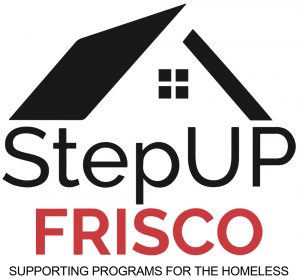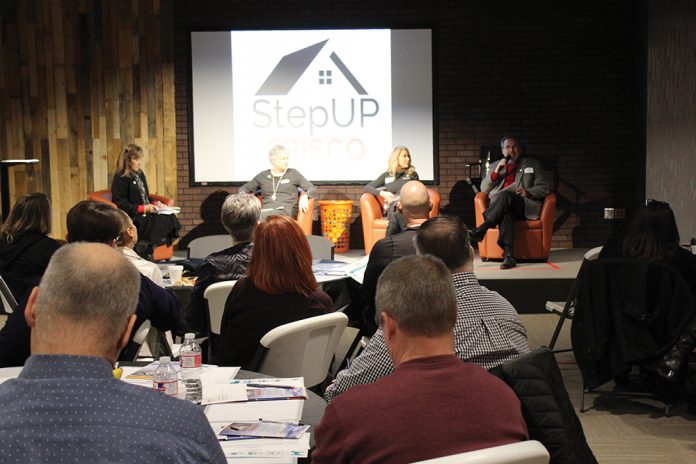A woman sits at her usual spot on the fourth floor of the Frisco Library. She looks around the room and spots a young man carrying a backpack that is too large to be just for school. There is a brief realization, then she crosses the room to speak with him. “Are you backpacking across Texas or are you homeless?” He looks at her and responds, “I am homeless.” Katherine Rourke smiles, reassuring him it is OK. She is homeless too.
Residents of Frisco have become more accustomed to parking next to luxury vehicles, dining at upscale restaurants and laying roots in some of the most prestigious neighborhoods in Texas. While there is certainly nothing wrong with this, to many living in Frisco, the image associated with homelessness looks more akin to the crowded streets of N.Y. or secluded corners of Chicago, not the thriving North Texas suburbs.
However, the reality is that people who are experiencing homelessness are not just in overcrowded cities or less affluent areas of the country … they are right under our noses. As seen in surrounding cities that experienced sudden growth, success can also introduce a new set of challenges when it comes to taking the best care of the people living within the city limits. In January 2019, a Point-In-Time Homeless Count was conducted and Collin County reported 558 people experiencing homelessness – up 31.9 percent from 2013. Denton County has 194 people reportedly experiencing homelessness – down 18.5 percent (both counties held their counts in January). A large and important aspect to consider when looking at these numbers is that many in the homeless population do not feel comfortable reporting for surveys, as they do not want to become another number.
 Many believe the road to homelessness is paved with drug abuse or alcoholism, when, in reality, the majority of homelessness can be traced to the loss of a job or a medical or family crisis, like it happened for Ms. Rourke. During her time in a hospital after breaking her ankle, an orthopedic specialist informed her she needed surgery. Without health insurance, Ms. Rourke was able to find a doctor who was willing to do the surgery for free. However, the hospital was not. She tried to pay for the hospital fees, but, in the end, it was not enough. After not being able to work during her recovery, Ms. Rourke found herself without a home.
Many believe the road to homelessness is paved with drug abuse or alcoholism, when, in reality, the majority of homelessness can be traced to the loss of a job or a medical or family crisis, like it happened for Ms. Rourke. During her time in a hospital after breaking her ankle, an orthopedic specialist informed her she needed surgery. Without health insurance, Ms. Rourke was able to find a doctor who was willing to do the surgery for free. However, the hospital was not. She tried to pay for the hospital fees, but, in the end, it was not enough. After not being able to work during her recovery, Ms. Rourke found herself without a home.
For the next five years, from the young man in the library to a woman who could be seen walking on crutches down Teel Parkway, Ms. Rourke encountered many who are praying for a place to rest their heads. An interaction one evening with a Frisco Police Officer was the catalyst that inspired her to begin to cultivate the idea of starting a shelter. While sleeping in her car, she was approached by a member of Frisco PD, but rather than asking Ms. Rourke to leave, the officer expressed relief. “I was so relieved you woke up and were alive,” he said. “I was afraid that you were another person who had committed suicide in their car.”
After finding herself a place to stay, Ms. Rourke believes she can help become part of a solution. Her dream is to rent a home that would allow those experiencing homelessness a place to rebuild. This dream is called “iShelterFrisco” and would be an environment for those in need of a house that feels like a home. “There are homeless people in Frisco who could use a place to go,” comments Danielle Belair, the real-estate agent from Monument Reality whom Ms. Rourke is working with. “This might be a stepping stone for them or give them just what is needed in their life at that time. We will need to find the right rental house – a house that has five or more bedrooms with four or more bathrooms. It needs to have a large enough lot that can have a place for a garden.” The groundwork has been laid, now the only issue that remains is funding.
 With a different approach, a local organization, StepUP Frisco, started by Ann Harris and Christine Ortega, advocates for existing homeless programs in Collin County that benefit those in need. “Our goal is for every faith organization and business, as well as individuals, to ‘StepUP’ and financially support the Samaritan Inn and City House, so they can expand their programs to shelter and support people in need. In addition, there is the Family Promise of Collin County program which is a national, faith-based organization that shelters families temporarily in churches who are homeless in a rotation basis among participating churches. For example, there are 13 churches in Plano currently active in Family Promise. We are hoping churches in Frisco will volunteer facilities to help. Once Frisco has stepped up, we plan to issue a challenge to other cities in Collin County to do the same,” says Mrs. Harris.
With a different approach, a local organization, StepUP Frisco, started by Ann Harris and Christine Ortega, advocates for existing homeless programs in Collin County that benefit those in need. “Our goal is for every faith organization and business, as well as individuals, to ‘StepUP’ and financially support the Samaritan Inn and City House, so they can expand their programs to shelter and support people in need. In addition, there is the Family Promise of Collin County program which is a national, faith-based organization that shelters families temporarily in churches who are homeless in a rotation basis among participating churches. For example, there are 13 churches in Plano currently active in Family Promise. We are hoping churches in Frisco will volunteer facilities to help. Once Frisco has stepped up, we plan to issue a challenge to other cities in Collin County to do the same,” says Mrs. Harris.
As opposed to starting a new program with an unproven history, StepUP directs sources to Samaritan Inn (if a family) or City House (if under 24 years old). “These organizations have a proven track record with programs that meet current needs, but also that teach how to get out of situations that cause homelessness through counseling, mentoring, job assistance, etc. As much as people in the community want to help by giving gift cards, food or cash to individuals they see who are homeless, this is only short-term and can enable them to stay in their current situation,” Mrs. Harris shares.
StepUP does not collect donations. Instead, any donations can be made directly to an existing organization (noted that it is for the StepUP initiative). The business community can donate directly or have team-building events in order to raise money. Faith organizations can have a special program or designate a percentage of their giving for the mission. Individuals can organize fundraisers, donate directly or volunteer with existing programs.
Mrs. Harris says, “We have a great community of givers, but sending out this type of message is not as attractive to many compared to recognizing the need to help stop certain diseases, for example. Frisco is being recognized for its tremendous growth, so it is not easy to admit that there is a growing homeless need here and still promote economic growth to the area.”
It is time that people stop turning a blind eye and believing there are not people in distress in Frisco … because there are. The opportunity to give to those in need must now become a priority.
Ashleigh Smith is a 21-year-old Frisco local studying journalism and visual and performing arts at Southern Methodist University. When she is not writing, you can find her teaching spin classes or reading a book in a local coffee shop.


